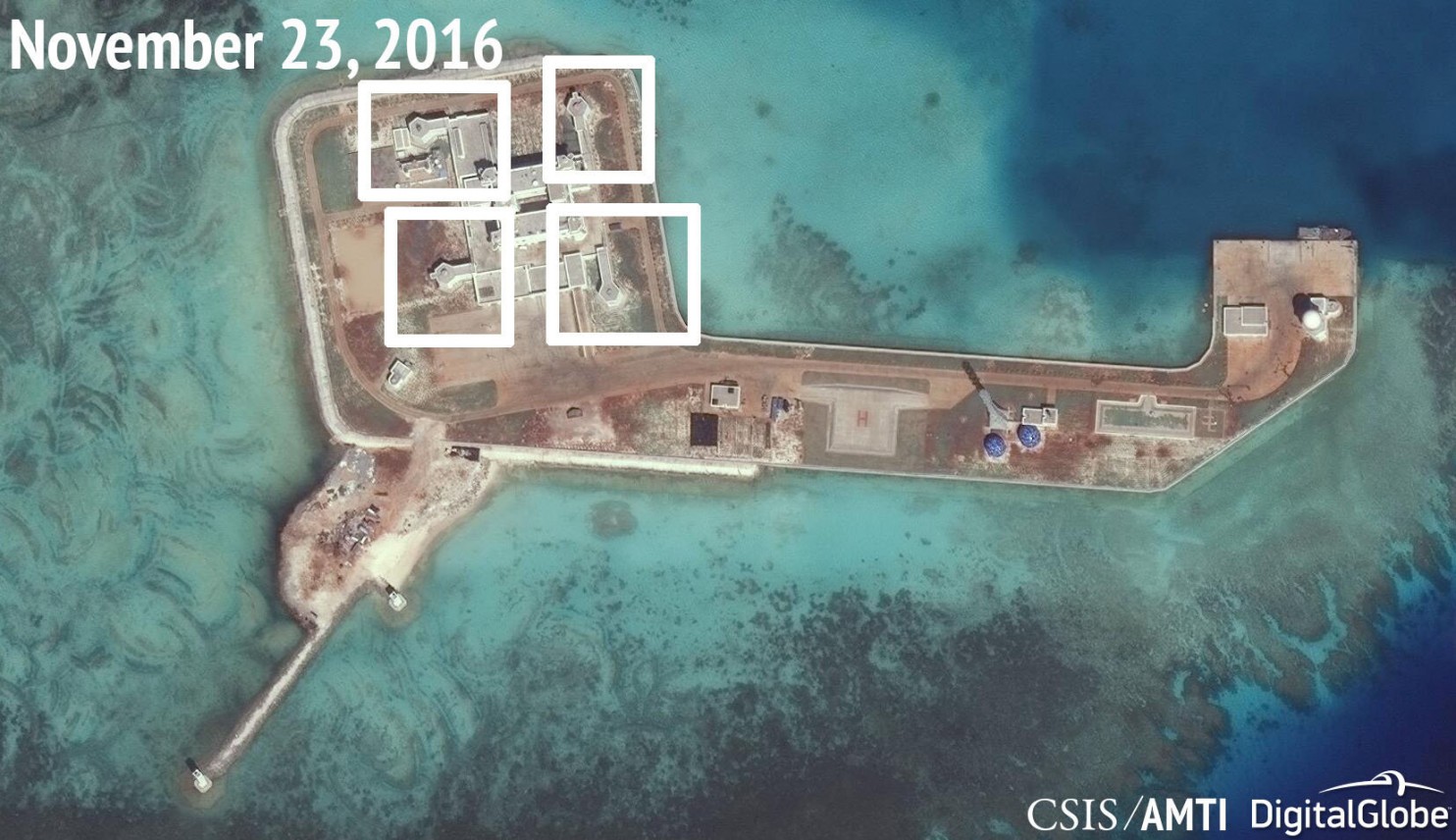Media Report

- The Wall Street Journal reports: "A U.S. think-tank report that China has installed antiaircraft and other weapons on all seven islands it has built in the South China Sea is raising the stakes in a regional dispute as U.S. President-elect Donald Trump signals he is ready to confront Beijing on territorial issues. The Asia Maritime Transparency Initiative said late Wednesday that satellite imagery showed China had installed the weapons in recent months, despite President Xi Jinping's pledge not to militarize the islands in the Spratly archipelago... China's Defense Ministry in a statement on its website Thursday afternoon reiterated that any reef construction was mainly for civil use, though it appeared to also send a message to the U.S. 'As to the necessary military facilities, they are mainly for defense and self-defense, which is appropriate and legal. For example, if someone is showing off their strength on your doorstep, can't you even prepare a slingshot?' "
- Foreign Policy comments: "In the months leading up to the American elections, Chinese officials viewed the prospect of a Donald Trump presidency as a manageable, even welcome, respite from growing friction with the outgoing Obama administration. But that blasé outlook has morphed into outright alarm and a spate of heated warnings, after Trump called into question four decades of policy and single-handedly undermined the bedrock of U.S.-China relations. Now Beijing is flying long-range bombers over the disputed South China Sea, and warning of a collapse of U.S.-Sino relations if the president-elect continues to hint at diplomatic recognition of Taiwan. [there are] worries that a U.S. administration seen in the region as hot-tempered and unpredictable will not only unhelpfully rattle leaders in China, but make it harder to work with partners and allies.' "
- The New York Times reports: "Lin Fei-fan led the charge nearly three years ago when hundreds of students occupied Taiwans's legislature to protest a trade deal with China. With the island's economy increasingly tied to the mainland's, and Beijing's global influence on the rise, he worried that Taiwan's independence was at stake - and might be a lost cause. Now, thanks to a couple of sentences uttered by Donald J. Trump on a talk show, Mr. Lin has new hope. The president-elect stunned the world on Sunday by suggesting he might abandon the One China principle...Mr. Lin, 28, and many like him. But it has also left them anxious, and asking: What does it mean for one's homeland to be put on the table by Mr. Trump, an inveterate deal maker, in negotiations with China's Communist leaders, who are not known for making concessions easily? 'Many people in Taiwan worry that once Trump takes office, he'll make a U-turn,' Mr. Lin said. 'We are suspicious of his motivations.'"
Calendar
- 2016-12-14 For Tillerson, South China Sea Storms Aren’t New
- 2016-12-13 China’s richest man’s threat to Trump: 20,000 US jobs are at stake “should things be handled poorly”
- 2016-12-12 A new China emerges on trade battlefield
- 2016-12-11 Trump Suggests Using Bedrock China Policy as Bargaining Chip
- 2016-12-09 China Faces Off Against World on Open Global Markets
- 2016-12-08 Trump’s Chinese Currency Manipulation
- 2016-12-07 Trump picks Iowa Gov. Terry Branstad — a ‘friend’ of China’s leader — as Beijing ambassador
- 2016-12-06 China Seeks ‘Strategic Composure’ in Trump Era of Diplomacy
- 2016-12-05 Trump, Taiwan and China: The Controversy, Explained
- 2016-12-04 Trump Camp Scrambles To Defend Diplomatic Blunder Over China And Taiwan
News
- The Wall Street Journal China Installs Weapons in the South China Sea, Satellite Show
- The New York Times Taiwan is Both Exhilarated and Unnerved by Trump's China Remarks
- The Wall Street Journal China Halts Trading in Key Bond Futures as Panicky Investors Sell Securities
- Bloomberg Kissinger at 93 Expounds on Rex Tillerson, 'One-China' and Trump
- Reuters China Expected to Lose Top U.S. Creditor Crown to Japan as Yuan Struggles
- Reuters China Takes Action On Thousands of Websites for 'Harmful' Obscene Content
- The Financial Times Crown Resorts Pares Global Ambitions Following China Arrests
- NPR China Exonerates Man Executed 21 Years Ago For a murder He Did Not Commit
- The New York Times China's Meitu, an Aspirational Beauty App, Goes Public
- The Washington Post Smokers Chased in Beijing as China Considers National Law
- BBC China's Spiraling Property Prices
Commentary
- Foreign Policy Is Trump Starting Something With China He Can't Finish?
- Time Why Donald Trump Really Shouldn't Play Games with China Over Taiwan
- Fortune China's Yuan Just Drooped to an 8-Year Low After the Fed Decision
- Forbes Why China is Concerned With Money Outflows
- The Economist China's Digital Dictatorship
- The Washington Post: Global Opinions 45 Years Ago Kissinger Imagined a 'Pivot' to Russia. Will Trump Make it Happen?
- The Diplomat US Media Over-Hypes Chinese Bomber 'Warning' in South China Sea
